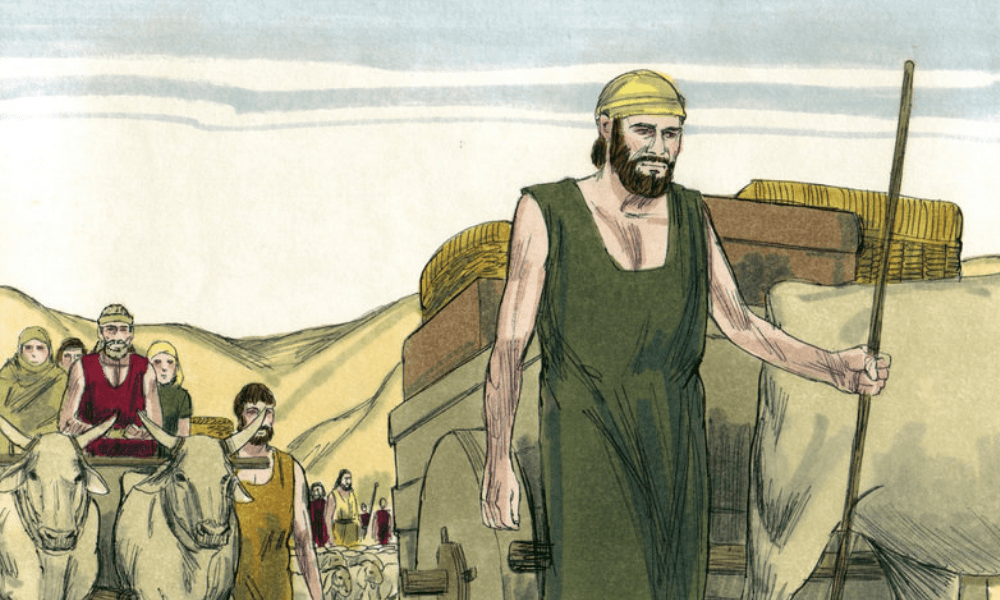Who was Phineas, after whom our Parasha is named? He was the grandson of Aaron the High Priest, who took action when everyone else was paralyzed with disbelief and confusion. At the end of the previous Parasha we read of Zimri, the Israelite man who brought a Midianite woman with him to the Tabernacle. While all the spectators, Moshe included, were crying in view of this desecration, Phineas rose, took a spear, followed the two into the chamber, and killed both. His act served as a deterrent to those who thought of imitating Zimri, and prompted God to forgive the Israelites and to bring the plague, sign of the Divine wrath, to a halt.
In the beginning of our Parasha God blesses Phineas and declares a pact of peace with him. The Hebrew word for peace – שלום – displays a unique phenomenon. According to Jewish law, if any letter of the Torah scroll is split in half, the Torah scroll is rendered invalid until fixed. The one exception is in the word שלום in our Parasha. The letter vav of that word must be written, instead of one long line, in two pieces. It is called Vav Keti’a – the broken vav.
Why did God have to declare a pact of peace with Phineas and why is the vav of שלום broken?
There can be two answers to this question:
Sometimes, peace must be broken. If there is a union of wicked people, or an axis of evil, it must be disrupted and stopped. Just as no one in his right mind will hail a peace treaty between two terrorist organizations, so also the unity of the Israelites against God and the Torah had to be stopped.
Or, we can have an opposite conclusion, which is that peace achieved through violence is incomplete, broken.
So, which path do we take? What do we do when we face a crisis of faith or when we witness a sin about to be committed? Do we charge and attack? Do we stand by idly and contemplate the possibilities, going through all probable scenarios?
I believe that the answer is that both approaches to the broken vav should dictate the course of action. In situations of urgency or confusion, when immediate action is needed but confusion is great and there is no clear hierarchy or instructions, one must do what is necessary, but he must also be able to defend his acts.
If, for example, a wayward train speeds towards passengers on a platform, and a brave man saves them by pushing someone over the tracks, he will have to be able to prove that:
He was unable to jump himself and had to push someone else.
There was no way of saving the passengers without sacrificing one life.
Most importantly, he will have to prove that the person pushed was chosen randomly and he had no grudge against him.
And then, when all was said and done, the savior will have to live with the awareness that he had taken a life.
Most of us, hopefully, will not have to make such instantaneous life-and-death decisions, but this process also applies to what we conceive as mundane or trivial issues.
When criticizing a child, a friend, or a fellow congregant, for deviating from what we think is the religious norm, we have to ask ourselves some questions:
Is this the best way to approach the issue?
Are there any other opinions which will sanction that person’s stance?
Am I being a zealot because I care about God and the Torah, or because of an ulterior motive, such as a grudge against the person rebuked, arrogance, or pretense?
The broken Vav in the word שלום and God’s pact with Phineas reminds us that these are not easy decisions, and perhaps we should consider other alternatives. We should know that our decision and action might haunt us our whole life and that we will need to rely on God’s help and love, His pact of peace, for healing. Is this pact guaranteed for us as it was for Phineas?
We should constantly evaluate our actions and their impact on ourselves and our circles of acquaintances, we should set our values right and be willing to take action, so when the need arises we can make the right decision without hesitation, maybe saving the lives of ones or many.
Shabbat Shalom
Rabbi Haim Ovadia
Answer for Balak’s riddle:
A serpent which is not: the word נחש in 23:23 means spell and not serpent; a human bird: צפור the father of Balak; The Israeli commercial fleet: צים in 24:24.
Riddles for Phinehas:
- Where is the only place in the Torah scroll in which the broken is whole?
- In our parasha, seven are named: one who they say lived for ever, one brave mother, and five Zionists. Who are they?








Ohr HaChaim Yomi – Emor